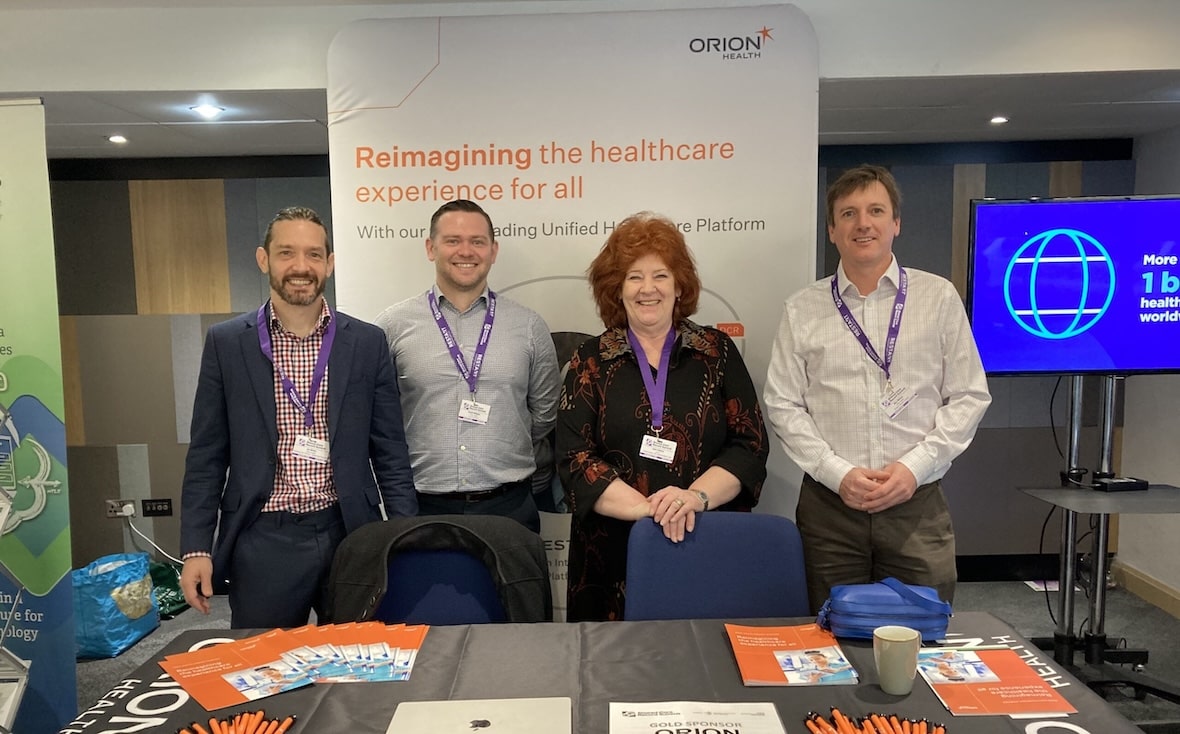Last month, the UK & Ireland team hosted the annual Orion Health Tech Forum in Sutton Coldfield, marking the event’s 10th anniversary of bringing together customers, partners and peers to share best practices and learnings for shared care records.
This year’s theme, “A decade of evolution: Shared care records past to future”, was dedicated to celebrating the significant technological milestones our customers have achieved and looking forward to future developments that will continue to transform patient care.
The UK’s pioneering role in integrated care
The day kicked off with Orion Health CEO, Brad Porter, recognising the collective effort from everyone in the room to change the way care is delivered across the country. Demand for shared care records globally is growing – from Ireland and Wales to Canada and New Zealand – and England’s successes are fuelling these discussions on how best to leverage technology to create more cohesive and efficient healthcare systems.
As a business, Orion Health is laser focused on ensuring customers can seamlessly transition from viewing to doing so that adoption of the platform continues to grow, and that it continues to provide value to health and care workers and patients. With interoperability at its core, the shared care record lays the foundations for key priorities such as regional convergence, the National Record Locator and giving patients access to more of their data via the NHS App.
Beyond boundaries: Longitudinal, latitudinal and live
A significant point of discussion from EMEA VP, Mark Hindle, and an ongoing talking point throughout the day, was the need for shared care records to be longitudinal, latitudinal and live.
Longitudinal records, which capture comprehensive patient information over time, should not be confined to a single organisation or region. Instead, they should provide a holistic view of a patient’s medical history, ensuring continuity of care regardless of geographical location. This is crucial for managing chronic conditions, coordinating care among multiple providers and enabling a more personalised healthcare experience.
Keynote speaker John Farenden of Red Kite Health Consulting discussed the huge impact shared care records can have on patient care as he walked through 85 years of patient information sharing, the learnings and where things might go in the future – reaffirming that patients are the constant and solutions should be built around the person receiving care.
Making the leap from viewing to doing
Referring to Mark’s opening remarks about shared care records being latitudinal, this means they should go deeper than just displaying information and should facilitate better coordinated and joined-up care, like in the case of the Northern Ireland Electronic Care Record (NIECR).
Stephen Beattie and Dr Neil Black took us on the journey of the NIECR, charting 10 years of triumphs with usage of the system continuing to grow as they enhance functionality — from care pathways and forms to radiology ordering and e-triage. The success of their national Diabetes Care Pathway, which makes it much easier for all of those involved in a patient’s care to access accurate and timely information and be more proactive in providing treatment, is an excellent example of what can be achieved when a shared care record goes deeper.
Real-time data: Delivering compassionate healthcare
We heard a powerful discussion between Jane Owens of Joined Up Care Derbyshire and Jane Bullard from NHS Devon on the essential role of end-of-life care planning. Both organisations are leveraging their shared care records to capture care plans containing the needs and treatment goals of patients who are unstable or at risk of dying. Creating these plans within the shared care record ensures everyone involved in a patient’s care is aware of their wishes, enabling care to be coordinated effectively and compassionately.
Again, considering Mark’s point that shared care records should be live and dynamic, rather than static like an Excel file, the end-of-life care planning use case highlights just one reason why real-time data sharing in healthcare is so important. By providing health and care staff with up-to-date and complete information on patients, they can deliver more effective, responsive and personalised care, ultimately improving patient safety and outcomes.
Empowering patients: Putting those in need at the heart
The need to empower patients by simplifying access to their healthcare information and creating an equitable health system was the key theme of the afternoon.
Laura McCrae, Associate Product Director of Orion Health’s Virtuoso Digital Front Door, shared her work on integrating shared care record data into the NHS App. Being the first time this has been done at the ICB level and starting with viewing appointments, this is an exciting stepping stone towards really giving patients the power to actively engage in their care.
Up next was Katie Thorn, Project Lead at Digital Care Hub. Katie took us on a deep dive into adult social care, the benefits of sharing information between health and social care and how it leads to better service and outcomes for those in need.
To end the day, Katie Dowson, Director of Digital at South Yorkshire Integrated Care Board, gave a moving talk on digital transformation and ensuring no one gets left behind, particularly as more and more services move online. Katie shared her inspirational efforts in tacking digital exclusion and the tangible difference it makes to people’s lives.
Looking ahead
This year’s Health Tech Forum ended with a strong sense of optimism about the future of shared care records. The day served as a powerful reminder of the progress made over the past decade and the exciting possibilities that lie ahead.
With continued innovation and collaboration, we can build on the solid foundations in place today so that shared care records of the future are longitudinal, latitudinal and live, and play an even more central role in transforming healthcare for the better. This evolution promises not only to enhance the quality of care but also to empower patients and create a more equitable and accessible healthcare landscape for all.



